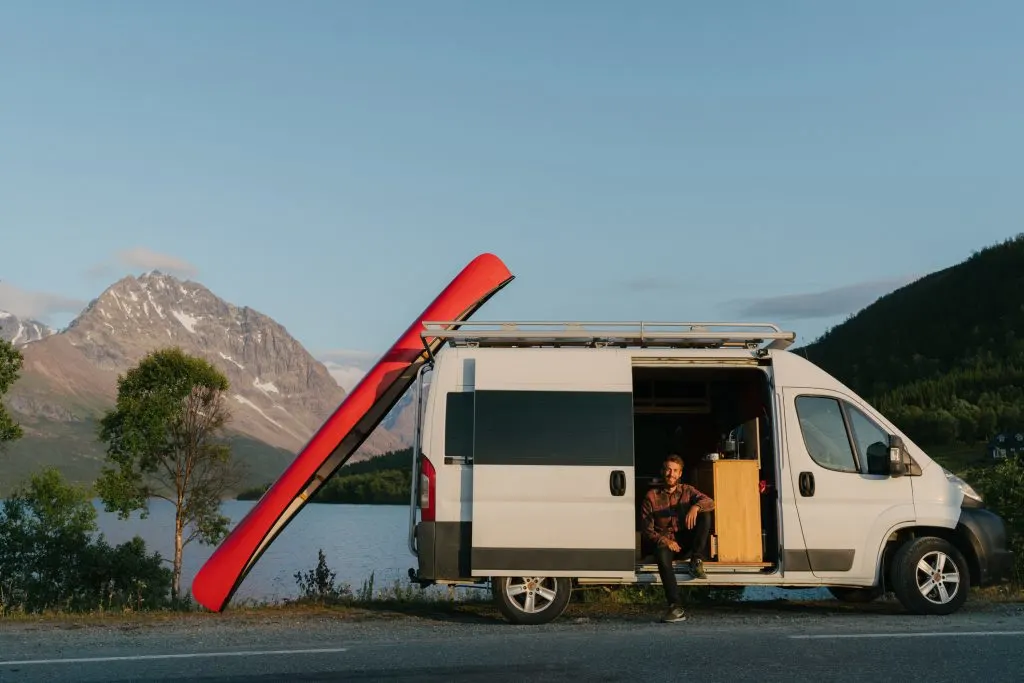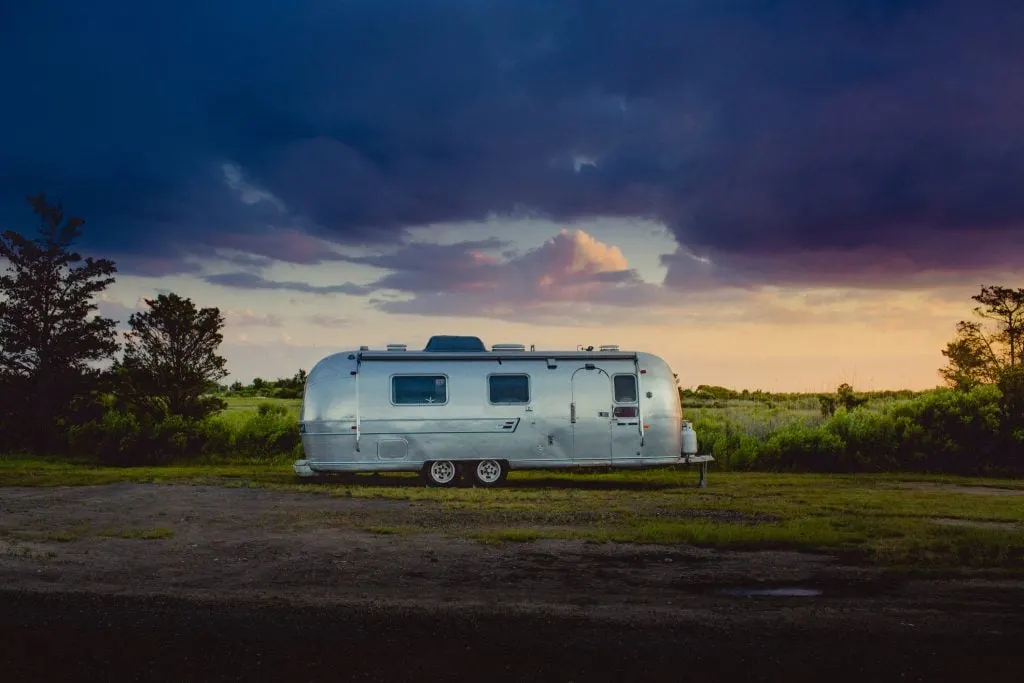The Pros and Cons of RV Class Types
Everyone’s RVing style (and budget) is different, and because of that, there are multiple types of RV Classes available on the market today.
What works for one person or family won’t work for another, and vice versa. Whether you’re just getting started out on your RVing journey or are looking to make a change, knowing the pros and cons of RV classes will help you make the best decision possible.
Today we’re going to take a look at all RV classes and share the pros & cons.
How Many RV Class Types Exist?
There are five major RV class types. These five are divided into two categories; drivable and towable.
The drivable RVs are Class A, Class B, and Class C RVs. The towable RVs are travel trailers and fifth-wheels.
Additional types exist, like truck campers, teardrops, B+, and Super C RVs. Click the links to learn more about those. However, for today’s purpose, we’re sticking to the most traditional RV types.
Class A
Class A RVs are the biggest motorized RVs and can feel similar to a small house or apartment – a real “home on wheels.” Class A RVs vary in length – as short as 26′ to as long as 45′ or more.

Pros
- Tons of living space and storage space – has the most storage space of all motorized RVs.
- Class A’s typically have large holding tanks for fresh, gray, and black water.
- Can have just about any amenity you need depending on model: kitchen, eating area, living area, full bathroom, some even have washer/dryer combos.
- Can tow a vehicle or trailer behind.
- Large panoramic view of the road with seats up high for a great traveling experience.
- Good option for multiple people or families.
Cons
- Your engine and your “home” are together, which can be inconvenient if you need to have work done.
- Class A RVs can feel scary to drive.
- They can’t fit in certain places or down certain roads due to size and maneuverability.
- The large windshield area can make it harder to heat up or cool down the space.
- Expensive to fill up fuel and low MPG.
- Most expensive RV Class to maintain.
Class B
Class B RVs are built on van chassis and are the smallest motorized RVs. Size can vary, but most lengths range from 17′ to 19′. Last week we published an article title “5 Reasons to Avoid Class B RVs.”
While our personal RV needs can’t be met in a Class B, you may find them perfect for your travels!

Pros
- Most comfortable of all motorized RVs to drive, feels just like driving a van.
- Most Class B RVs can fit in a regular parking spot.
- Best gas mileage of all motorized RVs.
- Ability to access remote campsites and drive on scenic, winding roads where larger RVs cannot go.
Cons
- Minimal interior space.
- Price per square foot is the highest of all RVs.
- Great option for solo travelers.
- Relatively limited storage, best for weekend trips.
- Limited amenities, typically won’t have a full kitchen or full bathroom.
- It will usually also be your daily driver, meaning you can’t set up camp and go out and explore because your exploring vehicle is also your home on wheels.
Class C
Class C motorhomes are bigger than class B’s, and smaller than class A’s. They feature a cab-over area that is either a sleeping space, storage space, or an entertainment center and can range in length from 21′ up to 40′.

Pros
- More comfortable to drive than a Class A, feels similar to a large truck.
- Decently sized holding tanks.
- Class C RVs have all the standard RV amenities, like a kitchen, bathroom, shower, and living area.
- Easier to heat and cool due to smaller windshield and a separated cockpit area.
Cons
- Size can be prohibitive when wanting to access tight spots or remote locations.
- Gas can be expensive.
- Limited living and storage space makes this model best for couples or small families.
- Some models are more prone to water leaks in the cab-over area due to the curves and seams.
Travel Trailer
Travel trailers are pulled with a bumper hitch behind a tow vehicle. Depending on the travel trailer’s size and model, you can tow with anything from a large truck to a small or mid-size SUV. Lengths range anywhere from 10′ to 35′.
More than any other RV Class, travel trailers have the most options when purchasing. This, combined with their cost, make travel trailers the most popular RV Class in America.

Pros
- Many lightweight options on the market can be towed with small vehicles.
- Lighter weight means better MPG.
- Cheapest of all RVs, can find new models for as low at $12k.
- Separate from your vehicle – you can set up camp and still have a daily driver to go explore.
- No engine maintenance.
- Depending on model and size, travel trailers can have more than one actual “bedroom.”
Cons
- Building quality can seem cheap and flimsy in “lightweight” models that are not suitable for full-time wear and tear.
- It can be difficult to tow, especially in high winds or when weight is distributed incorrectly.
- Challenging to back up into tight campsites, takes a lot of practice.
- Less storage space than larger motorized RVs or fifth wheels.
Fifth Wheel
Fifth wheels are the largest towable RVs that connect to a tow vehicle with a kingpin hitch in the bed of a truck. Fifth wheels require a 1/2 truck or larger to pull due to their weight and size. Fifth wheels range in length from 30′ to 40′ or longer.
Due to the length and height of fifth-wheel RVs, the interior layouts can become quite creative!

Pros
- Most stable of towable RVs to drive due to the kingpin hitch.
- Most storage space of towable RVs.
- Many varieties of floorplans available for many different tastes.
- It can have multiple bedrooms and bathrooms.
- No engine maintenance.
- It truly feels like a house or apartment on wheels.
- More interior space than a motorhome of the same length because there is no cockpit area.
Cons
- Requires a more substantial, heavy-duty truck to pull. This can be cost-prohibitive.
- Difficult to maneuver into tight campsites, takes practice to learn to back up correctly.
- Less MPG when pulling a 5th wheel than a travel trailer.
- More expensive to maintain than a travel trailer because they usually have more moving parts, slides, etc.
- Can’t access some remote locations or go down certain roads due to length and height.
Still Don’t Know What RV Class is Best for You?
Buying an RV is a big deal and the stress can be overwhelming. If you need a little more coaching and direction, we recomennd checking out RV Buyers Bootcamp by the instructors of RV Masterclass.
The course walks you through the in-depth nuances of each RV type, negotiation strategies, and entering the RV lifestyle.
Keep in Mind – RV Class Type Has a Big Effect on Your Ability to go Free Camping.
To be honest with you, we hate paying for camping. There are so many free campsites in America (with complete privacy). You should give it a try! As a matter of fact, these free campsites are yours.
Every time you pay federal taxes, you’re contributing to these lands.
Here’s our list of the 20 Best Free Campsites in the USA.
Become a FREE CAMPING INSIDER and join the 100,000 campers that love to score the best site! Simply enter your email below.
Well I have a delima. I want to Boone dock and bring my toys. I figured I can’t have both. Rig to big to boone dock or rig the right size but can’t bring toys. If I obtain a “smaller” toy hauler trailer then I have my toys in my kitchen and sleeping area with no washer dryer. Those trailers tend to fall apart as well off road with toys. I want to full time and be a utube sensation from Mobile Alabama
Hey Phillip, nope, you can’t have it all! Life itself is full of consessions. And as far as being a utube sensation there are already too many out there as it is. That’s life! You just have to decide What is most important and give up the rest.
I have several additions to your great article:
One, a Class B motorhome con is not being able to stand up in them as they tend to be short or really short inside. I have yet to find one that I can stand up in.
5th Wheels are the smoothest on the highway in my experience. They are highly maneuverable compared to a travel trailer.
Your comment about 5th Wheels needing a big truck (I assume you mean 3/4 or 1-ton) is not always true depending on the size and weight. I have had two fifth wheels, one 21′ and one 26′-11″, and two 1/2-ton pickups to tow them with. Looking at the ratings, the larger 5th Wheel was just over 5,000 lbs. with a GVWR or 7,000 lbs. My current 1/2-ton has a towing capacity of 8,600 lbs. so the 5th Wheel, passengers and anything else I might carry in the truck is well within my 1/2-ton Chevy Silverado’s abilities.
Another good article. Thanks Jean
You overlooked one of the most versatile RVs on the market the Truck Camper such as Northern Lite or Artic Fox